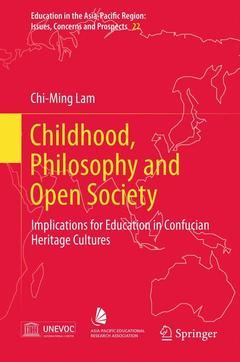Childhood, Philosophy and Open Society, 2013 Implications for Education in Confucian Heritage Cultures Education in the Asia-Pacific Region: Issues, Concerns and Prospects Series, Vol. 22
Auteur : Lam Chi-Ming

Chapter 1 - Introduction
1.1 Philosophy and Influence of Karl Popper
1.2 Aims and Significance of the Study
1.3 Argument and Outline of the Book
Chapter 2 - Theoretical and Practical Justifications for Popper’s Non-Justificationism
2.1 Introduction
2.2 The Problem of the Bounds of Reason
2.3 Solution One: Comprehensive Rationalism
2.4 Solution Two: Critical Rationalism
2.5 Solution Three: Comprehensively Critical Rationalism
2.6 From Theory to Practice
2.7 The Problem of Practicality
2.8 Conclusion
Chapter 3 - Education for Open Society as an Educational Ideal
3.1 Introduction
3.2 The Ideal of Open Society
3.3 The Role of Education in Open Society
3.4 Confucianism and Critical Rationalism
3.5 How Lipman’s Philosophy for Children Programme Fits the Popperian Ideal
3.6 Conclusion
Chapter 4 - An Empirical Study of the Effectiveness of Lipman’s Philosophy for Children Programme on Promoting Children’s Critical Thinking in Hong Kong, China
4.1 Introduction
4.2 Method
4.3 Results
4.4 Discussion
Chapter 5 - Reconceptualisation of Childhood for Promoting Justice in an Open Society
5.1 Introduction
5.2 Construction of Childhood in Philosophy, Psychology, and Sociology
5.3 Deconstruction of Childhood for Exposing Injustices Towards Children
5.4 Reconstruction of Childhood as a Way to Justice
5.5 Conclusion
Chapter 6 - Conclusions
6.1 Outcomes of the Study
6.2 Implications for Theory and Practice
6.3 Suggestions for Further Research
Chi-Ming Lam is Assistant Professor in Philosophy and Education in the Department of International Education and Lifelong Learning at the Hong Kong Institute of Education. His research interests include the philosophy of Karl Popper, critical thinking, and philosophy for children. He has published and presented on these areas both nationally and internationally.
The first attempt to explicate how Lipman’s Philosophy for Children programme helps to achieve Popper’s educational ideal of fostering critical thinking in children for full participation in an open society
In developing a Popperian theory and practice of education, not only explores Popper’s epistemological, political, and pedagogical concerns, but also considers the related sociological implications
Reports the first systematic investigation into the effectiveness of Lipman’s Philosophy for Children programme on promoting children’s critical thinking in Hong Kong, China – arguably a Confucian heritage society
Includes supplementary material: sn.pub/extras
Date de parution : 04-2015
Ouvrage de 185 p.
15.5x23.5 cm
Disponible chez l'éditeur (délai d'approvisionnement : 15 jours).
Prix indicatif 105,49 €
Ajouter au panierDate de parution : 05-2013
Ouvrage de 185 p.
15.5x23.5 cm
Disponible chez l'éditeur (délai d'approvisionnement : 15 jours).
Prix indicatif 105,49 €
Ajouter au panier


